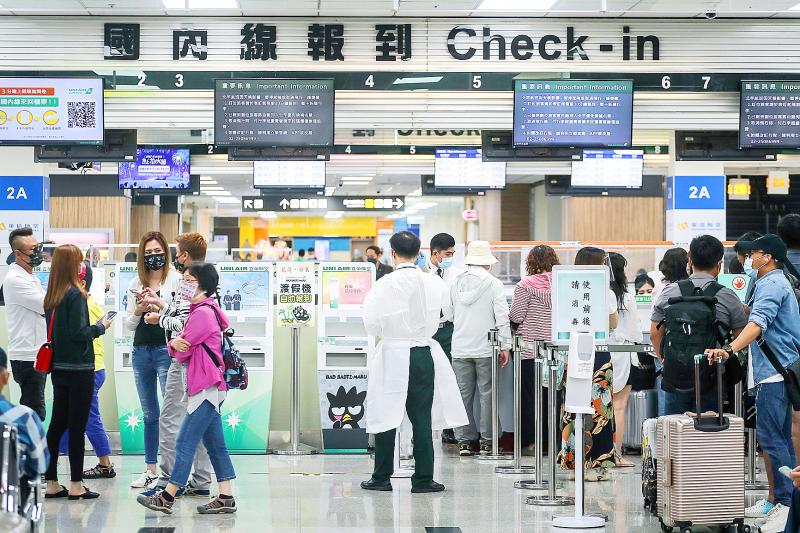Several local insurance companies have halted sales of overseas travel insurance policies that cover against medical expenses due to sudden illness, in a bid to curb potential losses amid payouts for COVID-19, company data showed.
As a result, people might find it more difficult to purchase insurance policies with coverage of medical expenses for sudden illness, which is required of travelers by some foreign governments, such as in the EU.
Since many insurers only offer travel insurance that compensates for losses in accidents or covers expenses for emergency rescue, travelers, if infected with COVID-19 abroad, would likely have to pay for their medical treatment.

Photo: CNA
Insurers are halting sales of travel insurance as the amount of compensation for COVID-19 insurance policies had grown to NT$5.47 billion (US$183.92 million) as of Monday last week, nearly twice the premiums of NT$2.79 billion from sales of such products, Financial Supervisory Commission (FSC) data showed.
All insurance companies have terminated sales of COVID-19 insurance policies, with only a few vaccine insurance policies still available, the commission said.
Fubon Insurance Co (富邦產險) yesterday said on its Web site that it had suspended its travel inconvenience insurance policy as it is modifying the terms of the product, but still offers another policy, dubbed “travel safety insurance.”
Unlike the former policy, which covers against medical expenses, the travel safety insurance policy only covers expenses of emergency rescues, as well as losses from theft and fire, corporate data showed.
Cathay Century Insurance Co (國泰世紀產險) last week announced that it would stop selling its travel inconvenience insurance and Schengen travel insurance because of numerous COVID-19 alerts overseas.
The insurance arm of Cathay Financial Holding Co (國泰金控) continues to sell another policy, also called “travel safety insurance,” which compensates those who are hurt in accidents abroad or their families if they die, corporate data showed.
Taiwan Life Insurance Co (台灣人壽) and CTBC Insurance Co (中國信託產險), insurance units of CTBC Financial Holding Co (中信金控), no longer offer travel insurance that covers sudden illness on their Web sites.
Nan Shan Life Insurance Co (南山人壽) has not suspended its travel insurance with coverage for medical expenses due to sudden illness, making it one of the few local insurers that still offers such a policy, corporate data showed.

South Korea’s equity benchmark yesterday crossed a new milestone just a month after surpassing the once-unthinkable 5,000 mark as surging global memory demand powers the country’s biggest chipmakers. The KOSPI advanced as much as 2.6 percent to a record 6,123, with Samsung Electronics Co and SK Hynix Inc each gaining more than 2 percent. With the benchmark now up 45 percent this year, South Korea’s stock market capitalization has also moved past France’s, following last month’s overtaking of Germany’s. Long overlooked by foreign funds, despite being undervalued, South Korean stocks have now emerged as clear winners in the global market. The so-called “artificial intelligence

NEW IDENTITY: Known for its software, India has expanded into hardware, with its semiconductor industry growing from US$38bn in 2023 to US$45bn to US$50bn India on Saturday inaugurated its first semiconductor assembly and test facility, a milestone in the government’s push to reduce dependence on foreign chipmakers and stake a claim in a sector dominated by China. Indian Prime Minister Narendra Modi opened US firm Micron Technology Inc’s semiconductor assembly, test and packaging unit in his home state of Gujarat, hailing the “dawn of a new era” for India’s technology ambitions. “When young Indians look back in the future, they will see this decade as the turning point in our tech future,” Modi told the event, which was broadcast on his YouTube channel. The plant would convert

‘SEISMIC SHIFT’: The researcher forecast there would be about 1.1 billion mobile shipments this year, down from 1.26 billion the prior year and erasing years of gains The global smartphone market is expected to contract 12.9 percent this year due to the unprecedented memorychip shortage, marking “a crisis like no other,” researcher International Data Corp (IDC) said. The new forecast, a dramatic revision down from earlier estimates, gives the latest accounting of the ongoing memory crunch that is affecting every corner of the electronics industry. The demand for advanced memory to power artificial intelligence (AI) tasks has drained global supply until well into next year and jeopardizes the business model of many smartphone makers. IDC forecast about 1.1 billion mobile shipments this year, down from 1.26 billion the prior

People stand in a Pokemon store in Tokyo on Thursday. One of the world highest-grossing franchises is celebrated its 30th anniversary yesterday.